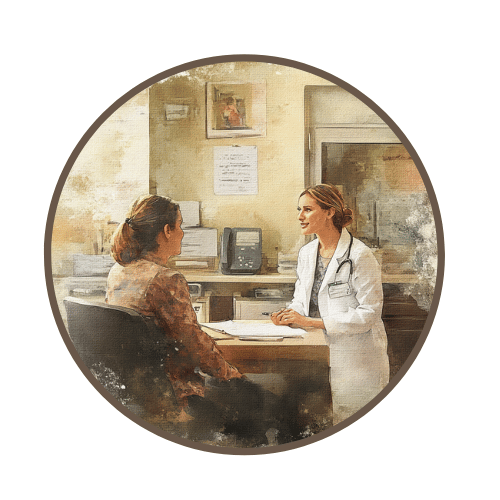In 2019, I went to see my Primary Care Provider about refilling a prescription. As I walked out of the two-minute, $75 appointment, I was flummoxed. She had thought I was pregnant, hadn’t mentioned my blood pressure reading, which seemed high, and tried to prescribe me something I hadn’t asked for. Had she even read my chart that the CNA had been so careful to update? I immediately called my nurse sister, who said, “She should have prescribed you blood pressure medications.” Now I was going to have to go back. At my next appointment, a calendar mistake meant I was fifteen minutes late, and they refused to see me but charged me the $75. So I drove across the valley to a clinic my sister recommended, shelled out another $150 for a new patient appointment, and got a prescription from a different doctor who would pay attention to me.
If I hadn’t been so passive, I could have saved myself $225. A simple, “my blood pressure read seemed a little high, what do you think?” was all it would have taken. But doctors scare me. I’m afraid of being dismissed and not believed, or treated like I am stupid; it’s happened before, especially as a believer in natural health solutions as a first resort.
Statistically, studies show older individuals, women, and people of color are less likely to speak up and advocate for themselves when faced with a confident authority figure such as a doctor. At the same time, women are also less likely to be believed by their care providers than their male counterparts. They are more likely to be labeled hypochondriacs and are less likely to be prescribed pain medication. Furthermore, women of color are less likely to be believed by care providers than white women, especially when describing pain levels. Bias in medicine, both gendered and racial, is a serious problem in our country. For example, black women are 50% more likely to die in childbirth than white women - that’s horrifying.
There are many reasons why communication breaks down between a care provider and their patient. So how do you advocate for yourself even if feeling intimidated?
Educate Yourself: Google is highly mocked by health professionals, but it is the only way we lay-people can research and learn. Especially if we sense something deeper wrong, Google is a useful resource. You can join forums if you think you may have a self-diagnosis and talk to other people who have experienced it. They can help you know what tests to ask for, what questions to ask, and how to navigate whether it really is what you think it may be. If you are fortunate enough to have a nurse or care provider in your social network, run your symptoms past them. My sister is the best source of knowledge I have, and she is fantastic at helping me navigate what I need to know.
Be Prepared: Have a list of questions written down to ensure you get the answers you need from your doctor. Remember that it is ok to insist on a test you feel you need, and prep yourself mentally for standing up against resistance should it come. Do not let the doctor leave the room until your questions are answered.
Be Specific: Track when your symptoms started, how long they lasted, the intensity, and exactly how they felt.
Insist: “This is not normal.” If you get what you think is a dismissive diagnosis, push. “I’ve had that diagnosis before (or, “I’ve researched that”), and this is not the same. Something else is wrong.” Especially if it is pain-related, and doubly so if that pain is reproductive. Women are conditioned to believe that periods are supposed to be painful. If it’s bad enough to see a doctor, you deserve an actual, test-result diagnosis and not a dismissal.
Call out Gaslighting or Dismissiveness: I once should have told a doctor, “I just told you I’ve tried that, and it didn’t work.” If they dismiss your pain, say, “I’m sorry, but I don’t feel like you are taking me seriously. I’m telling you this is a problem, and I am willing to put in the work to find out exactly what is wrong.”
If all else fails, find a new doctor that will take you seriously. I did!





2 comments
Christine Larkins
I agree! I switched doctors after a previous dr. insisted that I stay on a bp med after I complained of side effects. My new dr. Switched meds a week ago. Two weeks more will tell if this med is right for me. By the way, the new dr. is a great listener, caring and patient…. There are good docs out there. Keep looking!
Christine
You must be your own advocate. I recently had a general physician tell me to “go find another doctor” because I questioned him about the side effects of a prescribed bp med. Instead of saying you have been on this for 2 months, still are having side effects and your diastolic # is still too high—let’s try another med. NOO! He doubled the med dosage! I found another doctor who is a great listener, patient, caring—the opposite of the previous dr. She switched my med 6 days ago and I feel that in a couple of weeks I will know if the new med works w/out side effects or minimal effects and controls my blood pressure. There are good doctors—keep looking!
Leave a comment
All comments are moderated before being published.
This site is protected by hCaptcha and the hCaptcha Privacy Policy and Terms of Service apply.